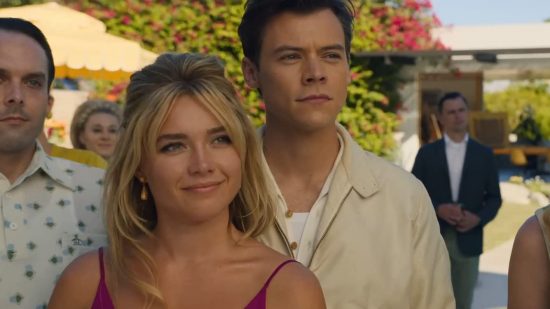Review: Don’t Worry Darling is fine and that’s all it needs to be
Some recent history:
Gaslight was released in 1944. Butterfield 8 in 1960, Stepford Wives in 1975, The Color Purple in 1985, Eyes Wide Shut in 1999 and Memoirs of a Geisha in 2005. High art about women catering to the whims of the patriarchy has been made in every decade that we’ve had movies. However, ironically, only recently have women exercised more control in shaping art about themselves, especially as directors. So recently, in fact, that we are currently living in the age of both female-led cinema and cinema attempting to subvert sexist norms. Promising Young Woman (director Emerald Fennell) and Titane (director Julia Ducournau) clear both bars, and the trailer for Don’t Worry Darling suggests that this film would too.
Don’t Worry Darling is Olivia Wilde’s second film as director. Her debut, Booksmart like Promising Young Woman, Ducournau’s Raw and Greta Gerwig’s Lady Bird subverted expectations as to what a genre movie should be. Booksmart was a savvy, snappy comedy about high school expectations, received to rapturous applause.
Oh! Look how easy it is to start comparing female directors as if what’s between their legs somehow links their art? None of us are immune. The scarcity of resources in filmmaking means that all eyes are trained on Wilde to deliver something astonishing in her second film in a way that Scorsese, Soderbergh and Spielberg weren’t (none of those directors’ sophomore movies are even close to their best work).
It’s clear that Wilde felt under pressure to make another film that said something important about women in society. So Wilde went the extra mile and switched genres. Don’t Worry Darling is a big-budget, serious drama with sci-fi elements.
Florence Pugh plays Alice, a perfect 50s housewife to Jack (Harry Styles), playing Elvis in a business suit. Every day, Jack and his pals zoom off in their Cadillacs to work at a remote Bond villain lair on a secret project called Victory for mysterious bigwig Frank (Chris Pine). This leaves the wives to keep house, shop, gossip and attend Frank’s wife Shelley’s (Gemma Chan) ballet classes. Alice is plagued by weird hallucination-like flashes. When fellow housewife Margaret (Kiki Layne) causes a scene at a soirée, Alice begins to push against the boundaries of her pristine life, meeting resistance from both the men and women around her.
Don’t Worry Darling is relentlessly cinematic with interesting twists. The period setting is gorgeous, perfectly capturing male-focussed idyllic family life ripped from a glossy magazine. Pugh’s performance is wonderful. Her presence dominates the film and as usual, she gives everything. Wilde is not afraid to use her lead, filling the screen with Pugh’s face then letting her move: dancing, running, spinning, hurtling. The music is stirring, the set pieces thrilling, the mood eerie. This film should be the ideal sophomore feature.
But…
Mirroring Alice’s predicament, there’s something not quite right about this film. For one thing, the three-act structure doesn’t exist within it. Don’t Worry Darling is 100 minutes of set-up and 20 minutes of kitchen-sink plot-throwing. It belabours the idea that women don’t like being chained to that kitchen sink, as if that notion didn’t go out of style in 1960 (and having already been hammered home on by 2x Stepford Wives films and 1x Get Out). Plot threads are repeatedly pulled that go nowhere: What is Jack’s motivation? Why exactly is Frank running Project Victory? Who is Shelley and what does she want? In fact, Pine and Chan are wasted, the latter delivering a brutal monologue that leads to no real pay-off. Wilde also self-directs as a character called Bunny with a fascinating story that is never explored. And no, Styles isn’t up to this, but who would be, against Pugh, a screen talent for the ages.
Don’t Worry Darling is hyper-focussed on one woman’s repeated inability to be heard. It’s clearly about Wilde’s own experiences of oppression, an important story. It’s a shame nobody told Wilde that she’s over-egging the pudding. The film is well-made, entertaining and an aggressively fine second feature. And that’s okay. Not every film made by a woman has to be perfect. This movie is good enough to allow Wilde to make a third and a fourth film. Don’t Worry Darling is shouting above the cacophony, is Hollywood listening?










